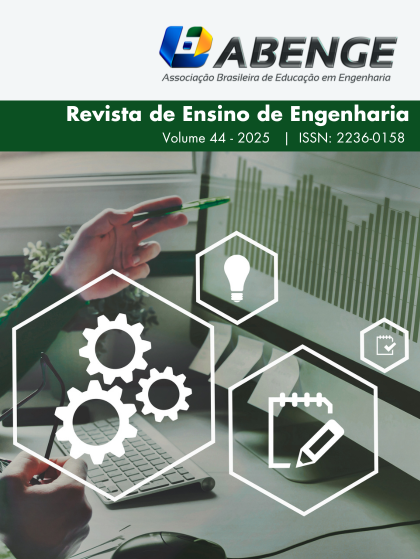STEAM Careers for Girls: Methodology Proposal for Elementary Schools
Keywords:
women in science, gender gap, children booklet, equity in professional careers, gender equalityAbstract
This article develops a methodology to introduce children to STEAM and environmental careers with an egalitarian perspective, showcasing successful women in a globally replicable booklet. The material inspires girls to explore fields such as architecture, landscaping, urban planning, and science. The methodology is adaptable to diverse cultural and educational contexts, promoting gender-inclusive STEAM education. Tested in Santa Maria-RS, it involves activities for the entire class, including boys. The results show increased interest and engagement from the children, evidenced by completed homework and positive feedback.
References
CARNICELLI, S.; BOLUK, K. The promotion of social justice: Service learning for transformative education. Journal of Hospitality, Leisure, Sport & Tourism Education, [S.L.], v. 21, p. 126-134, nov. 2017.
CFF. Energia solar no Brasil: quais são as barreiras e oportunidades para as profissionais mulheres no setor. C40 Cities Finance Facility. Brasília, 2021.
DEL-BURGO, J. F. et al. Exploratory study on didactic aspects used in scientific-technical (STEM) dissemination conferences for students of secondary education. Journal of Technology and Science Education, [S.L.], v. 12, n. 1, p. 86, 10 fev. 2022.
FUESTING, M.; DIEKMAN, A. B.; HUDIBURGH, L. From classroom to career: the unique role of communal processes in predicting interest in STEM careers. Social Psychology of Education, [S.L.], v. 20, n. 4, p. 875-896, 8 set. 2017.
GWNET. GLOBAL WOMEN’S NETWORK FOR THE ENERGY TRANSITION. Women for Sustainable Energy: Strategies to Foster Women’s Talent for Transformational Change, 2019. In Portuguese. Available at: https://www.globalwomennet.org/ women-for-sustainable-energy/. Accessed 14 sep. 2024.
JACKSON, M. C. et al. Talking about science interests: the importance of social recognition when students talk about their interests in STEM. Social Psychology of Education, 22(1), 149–167, 2019. [S.L.], v. 22, n. 1, p. 149-167, 31 out. 2018. Springer Science and Business Media LLC.
KANG, H. et al. How do middle school girls of color develop STEM identities? Middle school girls’ participation in science activities and identification with STEM careers. Science Education, [S.L.], v. 103, n. 2, p. 418-439, 31 dez. 2018.
KAREN, D. No Child Left Behind? Sociology Ignored! Sociology of Education, [S.L], v. 78, n. 2, p. 165-169, 2005.
LILLARD, A. S.; ELSE‐QUEST, N. M. Evaluating Montessori Education. Science, [S.L.], v. 313, n. 5795, p. 1893-1894. 2006.
MAY, G.; CHUBIN, D. E. A retrospective on undergraduate engineering success for underrepresented Minority students. Journal Of Engineering Education, [S.L.], v. 92, n. 1, p. 27-39, 2003.
MUNARI, A. Jean Piaget. Org.: Daniele Saheb. Recife: Fundação Joaquim Nabuco, Editora Massangana, 2010.
MUSEUS, S. D. Special issue: Racial and Ethnic Minority Students’ Success in STEM Education. (n.d.). https://eric.ed.gov/?id=EJ919997.
OAKES, J. Lost talent: the underrepresentation of women, minorities, and disabled persons in science. Santa Monica (CA): Rand Publishers, 1990.
OECD/ECLAC/CAF. Latin American Economic Outlook 2017: Youth, Skills and Entrepreneurship, OECD Publishing. Paris, 2016.
OGEGBO, A.A.; AINA, A.Y. Exploring young students’ attitude towards coding and its relationship with STEM career interest. Education And Information Technologies, [S.L.], p. 365-1314, 2023. Springer Science and Business Media LLC. http://dx.doi.org/10.1007/s10639-023-12133-5.
PAN, A. C. et al. A realidade das mulheres no setor da energia solar. Revista 3 S - Solar, Sustainable Solutions, 1ª edição - Vol.1, p. 35-39, 2020.
PAPADAKIS, S., KALOGIANNAKIS, M., GÖZÜM, A.I.C. Editorial: stem, steam, computational thinking, and coding. Frontiers In Psychology, [S.L.], v. 13, 2022. Frontiers Media SA.
PIAGET, J. The Equilibration of Cognitive Structures: The Central Problem of Intellectual Development. Chicago and London: University of Chicago Press, 1985.
SCHÖN, D. A. Educating the reflective practitioner: Toward a new design for teaching and learning in the professions. Jossey-Bass, 1987.
SHEVTSHENKO, E. et al. Dissemination of Engineering Education at Schools and its Adjustment to Needs of Enterprises. Daaam Proceedings, [S.L.], p. 0044-0053, 2017. DAAAM International Vienna.
UFSM. Federal University of Santa Maria. SAI - International support bureau. 2023. Available at: https://www.ufsm.br/orgaos-de-apoio/sai. Accessed 14 sep. 2024.


